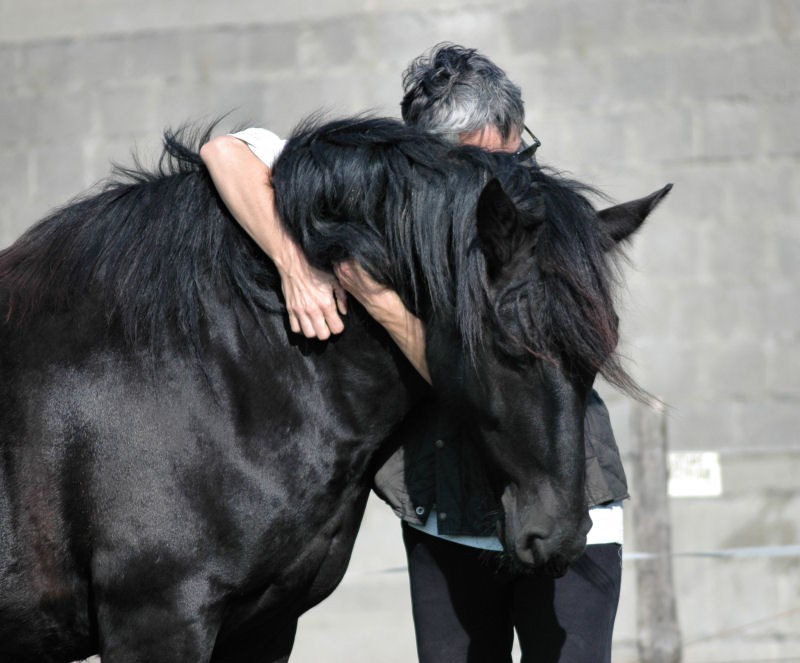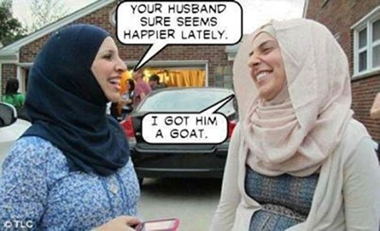Photo: A goat relaxes at the Buttercups Sanctuary for Goats, United Kingdom. Credit: Christian Nawroth
Posted on 07/07/2016 4:46:25 AM PDT by SJackson
Goats Form Intense Connections with Humans, Too
It's the first time a creature raised for food has evolved intense, meaningful connections with people.
Photo: A goat relaxes at the Buttercups Sanctuary for Goats, United Kingdom. Credit: Christian Nawroth
Goats have surprisingly just been added to the very short list of animals that are known to communicate in very direct and complex ways with humans.
The other two animals, dogs and horses, are often raised as companions to humans, so the goat findings -- reported in the journal Royal Society Biology Letters -- mark the first time that an animal raised primarily for food has evolved such an intense and meaningful connection with our species.
RELATED: Brooklyn Park's New Staff Members Are Goats
"Goats are very social animals," the lead author of the study, Christian Nawroth, told Discovery News. "Being social definitely seems to be a prerequisite to interacting with other species."
That factor alone could help explain why cats tend to fail the basic test that dogs, horses and goats passed with ease. By necessity, wild cats evolved a more solitary lifestyle. While some individual cats do seem to connect well with their owners, the ability is not as widespread.
 Photo: A selfie shows researcher Christian Nawroth with one of the goats included in the study. Credit: Christian Nawroth
Photo: A selfie shows researcher Christian Nawroth with one of the goats included in the study. Credit: Christian Nawroth
Nawroth and colleagues Jemma Brett and Alan McElligott, from Queen Mary University of London's School of Biological and Chemical Sciences, conducted their research at Buttercups Sanctuary for Goats in the U.K., with funding provided by the Deutsche Forschungsgemeinschaft and Farm Sanctuary's "The Someone Project."
The researchers created an "unsolvable problem" task by placing a tasty treat under a plastic box with the lid sealed shut. The goats could therefore see the food, but could never get at it.
As the 34 goats, a mix of male and female, individually approached the box, most looked right into the eyes of a nearby human, as if hoping to obtain some guidance. They also adjusted their behavior to match the gaze and position of the human. From a scientific standpoint, this meant the goats were exhibiting referential and intentional communication with the humans.
 Photo: Goats at the U.K.'s Buttercups Sanctuary for Goats were subjects in the study Credit: Christian Nawroth
Photo: Goats at the U.K.'s Buttercups Sanctuary for Goats were subjects in the study Credit: Christian Nawroth
Goats can be challenging to keep as pets. They are loud herd animals with voracious appetites and they require a lot of space. But, owners who consider their goats to be pets anecdotally report that the animals are extremely affectionate and personable, in ways comparable to dogs and horses.
Dog studies may help pinpoint some of the factors at play in the relationship.
"Results from dogs indicate that genetics play a role," Nawroth said, adding that early experience with humans also seems to be a factor affecting the goat's behavior.
McElligott said that dogs view praise itself as a reward, which helps to fuel human-canine interactions. He and his colleagues are not sure yet if goats value human-offered praise as well.
RELATED: Baaaaa: Goats Are Really Smart
It appears, then, that domestication of any kind, even if it is just driven by food needs, can forever change how another species views us.
"Approximately one billion goats are used in farming worldwide, and we need to understand their cognitive abilities in order to improve welfare guidelines for them," McElligott said. "A very small proportion of goats are kept as pets, but better knowledge of the species in general could also help those."
RELATED: Tiger and Goat Forge Unlikely Friendship in Russian Zoo
Jan Langbein, of the Leibniz Institute for Farm Animal Biology, did not work on this study but has collaborated before with Nawroth on research concerning goats. He believes the new paper is of interest for many reasons.
"It broadens our understanding about the impact of domestication and human-animal interaction on cognitive abilities of animals and questioned some of the underlying theories," Langbein said. "Deeper understanding of the outstanding cognitive abilities of various farm animal species will probably help to achieve better welfare standards. Public knowledge about cognition in, and emotions of, farm animals will change consumers' attitudes towards them."
 Photo: Horses are well known for their interaction with humans. Credit: Nickel de Vives, Wikimedia Commons
Photo: Horses are well known for their interaction with humans. Credit: Nickel de Vives, Wikimedia Commons
Marie Nitzschner, formerly at MPI-EVA in Germany, is an independent researcher who studies dog-human communication and cooperation. She noted that the socio-cognitive skills of dogs and horses used to seem outstanding in the animal kingdom, but it could be that we have underestimated the abilities of other domesticated animals. She was astounded that goats exhibited human-directed referential communication.
Nitzschner told Discovery News: "This is quite a surprising finding, and questions the hypothesis that the selection for companionship shaped the human-directed, socio-cognitive skills in dogs and horses. Potentially, domestication itself might have a bigger impact on cognition than previously thought."
She concluded: "The growing body of literature on the cognitive skills of domestic, non-companion species might also have implications on how we treat goats and other farm animals. It seems that their cognitive skills are not so different from those our beloved dogs."
research sponsored by CAIR
Outdoors/Rural/wildlife/hunting/hiking/backpacking/National Parks/animals list please FR mail me to be on or off . And ping me is you see articles of interest.<
lol - funny.
Used to live in Northern Virginia where our HOA would hire a goat herder to clean out the common grounds. I can vouch that they have a voracious appetite.

Kids these days..
In AZ, we had a goat and a guard dog. Both of them would run around the 5 acre yard checking for intruders, using the same path around the fence line. Contractors were more afraid of the goat then the dog, because of the horns. I truly believe the goat that it was a dog and acted accordingly.
True statement.
Yep, they form relationships with my family, right up to the moment I load them in the trailer and take them to the sale barn. End of “relationship”,
and the check arrives in the mail in a few days....
This will certainly be good news to our Religion of Peace brethren.
In England, During WWII, my parents’ goats would panic at the sound of night-time sirens. The pub owner often called them to demand; ‘come and get your bloody goats off my bar’.
Ah - family legends never die.
Cabrito is the specialty at El Tio’s in Monterrey.
Goats eat poison ivy, which right there has great value.
A town near me hired a goat herd and the herder would move the electric fence every week or so as the goats denuded the landscape.
I made the mistake of touching the electric goat fence.
Once.
Nice article We raised Saanen dairy goats for 20 years. We knew they were smarter than dogs and showed that in many ways. We had a lot of births over the years and I had to help many. One behavior I particular I remember well. We had one breech birth, our only one. The doe kept trying on her own and too much time was going by, I knew something was wrong. It was difficult and painful for her, only time I ever heard one of them scream. It was finally over and successful. For about a week she kept licking my hand like a dog when I came in the pen each day. I felt she was showing gratitude. After about a week she stopped and never did it again, even after a successful birth later. It’s been 3 years since we had any I miss them!

I’ve been considering getting a couple. That’s the great thing, they eat the weeds and not the grass. What’s to hate?
Disclaimer: Opinions posted on Free Republic are those of the individual posters and do not necessarily represent the opinion of Free Republic or its management. All materials posted herein are protected by copyright law and the exemption for fair use of copyrighted works.